新概念第二册 L19 第19课教案
新概念第二册L19第19课教案
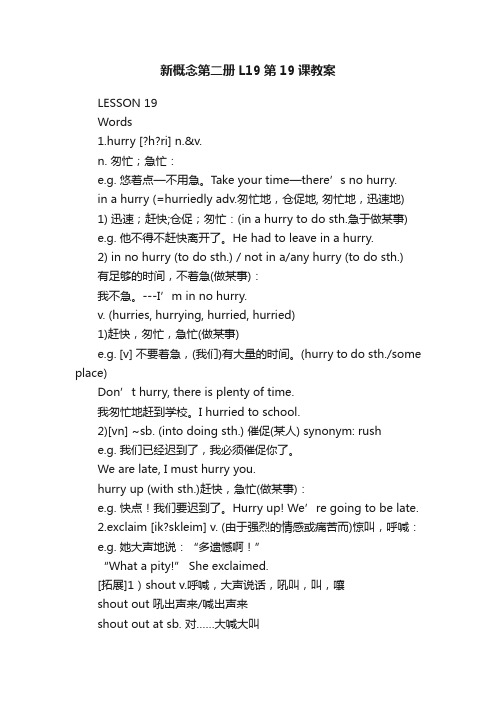
新概念第二册L19第19课教案LESSON 19Words1.hurry [?h?ri] n.&v.n. 匆忙;急忙:e.g. 悠着点—不用急。
Take your time—there’s no hurry.in a hurry (=hurriedly adv.匆忙地,仓促地, 匆忙地,迅速地)1) 迅速;赶快;仓促;匆忙:(in a hurry to do sth.急于做某事)e.g. 他不得不赶快离开了。
He had to leave in a hurry.2) in no hurry (to do sth.) / not in a/any hurry (to do sth.)有足够的时间,不着急(做某事):我不急。
---I’m in no hurry.v. (hurries, hurrying, hurried, hurried)1)赶快,匆忙,急忙(做某事)e.g. [v] 不要着急,(我们)有大量的时间。
(hurry to do sth./some place)Don’t hurry, there is plenty of time.我匆忙地赶到学校。
I hurried to school.2)[vn] ~sb. (into doing sth.) 催促(某人) synonym: rushe.g. 我们已经迟到了,我必须催促你了。
We are late, I must hurry you.hurry up (with sth.)赶快,急忙(做某事):e.g. 快点!我们要迟到了。
Hurry up! We’re going to be late.2.exclaim [ik?skleim] v. (由于强烈的情感或痛苦而)惊叫,呼喊:e.g. 她大声地说:“多遗憾啊!”“What a pity!” She exclaimed.[拓展]1)shout v.呼喊,大声说话,吼叫,叫,嚷shout out 吼出声来/喊出声来shout out at sb. 对……大喊大叫2)scream v. (因伤痛、害怕、激动等)尖叫、惨叫、惊叫exclamation[?ekskl??me??n] n. 感叹;感叹语;感叹词exclamation mark 感叹号3.return v. 1) 回来;回去;返回e.g. 你什么时候回到伦敦?When are you returning to London?2) 带回;送回;放回;归还,退还~sb./sth.(to sb./sth.)e.g.我准备去图书馆还书。
【ppt课件】新概念第二册第19课课件-精品文档

• How many kinds of tickets can I buy?
• If I want to buy a ticket,what can I say? • Can(May) I have a ticket,please? • If I want to return the ticket,what can I say? • Can I return the ticket? • If there aren't any tickets,what can I say? • What a pity!
“ The play may begin at any moment,” I said. “It may have begun already,” Susan answered.
at any moment: immediately, at once
随时都可能下雨。
It may rain (at) a arrive at any moment. may have begun: Her friend may have gone abroad. They may be waiting for you at the airport.
Lesson 19 Sold out
Yes, I did.
• Who was with you ?
Susan was.
• She thought the play might have begun already, didn't she ? • What did you do?
I hurried to the ticket office. Yes, she did.
d. wasn’t too pleased to get tickets for next Wednesday’s performance.
新概念英语第2册课件Lesson19(共15页)

4. We may go climbing in the Alps next summer. 5. --Can the news be true? --- It can’t be true.否
定时一定用cபைடு நூலகம்n’t ,may只用于肯定.
6. All the pubs are closing. We may as well go home.还是...好,不妨
7. -- I’ll go on Monday by train. -- You might just
as well wait till Tuesday and go by plane.
When was the play going to begin? Were there any tickets left? Why was the writer not very happy about those tickets?
1.may might, can /could / might as well
1. a 2. d 3. c 4. c 5. d 6. b 7. c 8. b 9. c 10. a 11. c 12. c
2. hurry to / hurry up / hurry off / in a hurry
3. sell sold sold / sold out / sell up / sell …at a low price/ sell…for $300
4. what a pity (it is) ! / That’s a pity! 5. exclaim / shout /cry 6. a return ticket / a single ticket 7. certainly / sure / of course
Rita-新概念英语教案 第二册 19--
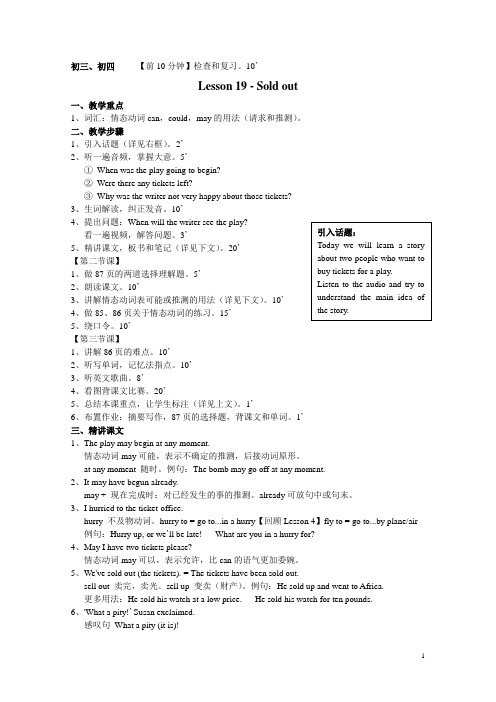
初三、初四【前10分钟】检查和复习。
10’Lesson 19 - Sold out一、教学重点1、词汇:情态动词can,could,may的用法(请求和推测)。
二、教学步骤1、引入话题(详见右框)。
2’2、听一遍音频,掌握大意。
5’①When was the play going to begin?②Were there any tickets left?③Why was the writer not very happy about those tickets?3、生词解读,纠正发音。
10’4、提出问题:When will the writer see the play?5、精讲课文,板书和笔记(详见下文)。
20’【第二节课】1、做87页的两道选择理解题。
5’2、朗读课文。
10’3、讲解情态动词表可能或推测的用法(详见下文)。
10’4、做85、86页关于情态动词的练习。
15’5、绕口令。
10’【第三节课】1、讲解86页的难点。
10’2、听写单词,记忆法指点。
10’3、听英文歌曲。
8’4、看图背课文比赛。
20’5、总结本课重点,让学生标注(详见上文)。
1’6、布置作业:摘要写作,87页的选择题,背课文和单词。
1’三、精讲课文1、The play may begin at any moment.情态动词may可能,表示不确定的推测,后接动词原形。
at any moment 随时。
例句:The bomb may go off at any moment.2、It may have begun already.may + 现在完成时:对已经发生的事的推测。
already可放句中或句末。
3、I hurried to the ticket-office.hurry 不及物动词。
hurry to = go to...in a hurry【回顾Lesson 4】fly to = go to...by plane/air 例句:Hurry up, or we’ll be late! What are you in a hurry for?4、May I have two tickets please?情态动词may可以,表示允许,比can的语气更加委婉。
新概念第二册 L19 第19课教案教学教材
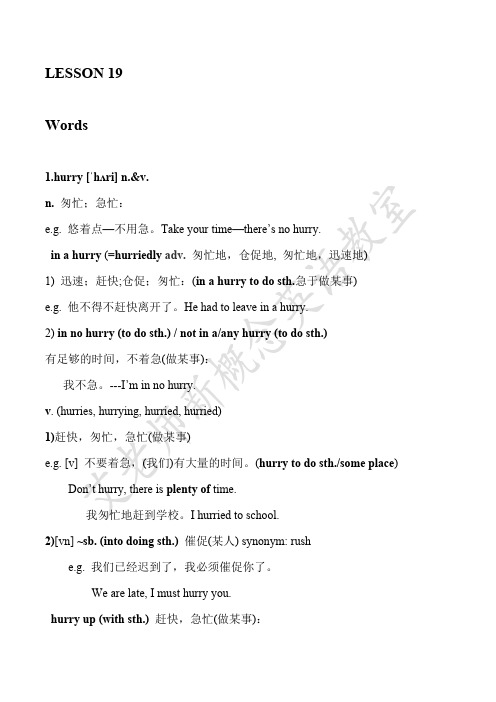
LESSON 19Words1.hurry [ˈhʌri] n.&v.n. 匆忙;急忙:e.g. 悠着点—不用急。
Take your time—there’s no hurry.in a hurry (=hurriedly adv.匆忙地,仓促地, 匆忙地,迅速地)1) 迅速;赶快;仓促;匆忙:(in a hurry to do sth.急于做某事)e.g. 他不得不赶快离开了。
He had to leave in a hurry.2) in no hurry (to do sth.) / not in a/any hurry (to do sth.)有足够的时间,不着急(做某事):我不急。
---I’m in no hurry.v. (hurries, hurrying, hurried, hurried)1)赶快,匆忙,急忙(做某事)e.g. [v] 不要着急,(我们)有大量的时间。
(hurry to do sth./some place)Don’t hurry, there is plenty of time.我匆忙地赶到学校。
I hurried to school.2)[vn] ~sb. (into doing sth.) 催促(某人) synonym: rushe.g. 我们已经迟到了,我必须催促你了。
We are late, I must hurry you.hurry up (with sth.)赶快,急忙(做某事):e.g. 快点!我们要迟到了。
Hurry up! We’re going to be late.2.exclaim [ikˈskleim] v. (由于强烈的情感或痛苦而)惊叫,呼喊:e.g. 她大声地说:“多遗憾啊!”“What a pity!” She exclaimed.[拓展]1)shout v.呼喊,大声说话,吼叫,叫,嚷shout out 吼出声来/喊出声来shout out at sb. 对……大喊大叫2)scream v. (因伤痛、害怕、激动等)尖叫、惨叫、惊叫exclamation[ˌekskləˈmeɪʃn] n. 感叹;感叹语;感叹词exclamation mark 感叹号3.return v. 1) 回来;回去;返回e.g. 你什么时候回到伦敦?When are you returning to London?2) 带回;送回;放回;归还,退还~sb./sth.(to sb./sth.)e.g.我准备去图书馆还书。
新概念第二册lesson19PPT课件

介绍定语从句的定义,说明限制性定语从句和非限制性定语从句的区别。
定语从句概念及种类
定语从句的构成和用法
非谓语动词概念及种类
非谓语动词的构成和用法
详细解释定语从句的构成方式,包括关系代词和关系副词的选用,给出相应的例句。
阐述非谓语动词的定义,列举常见的非谓语动词形式,如不定式、动名词和分词。
详细解释非谓语动词的构成方式,包括动词形式的变化和句子成分的搭配,给出相应的例句。
重点词汇2
championship(锦标赛)
例句
He won the world championship in tennis last year, making him one of the best players in the world.
重点词汇3
enthusiasm(热情)
例句
The crowd showed their enthusiasm for the home team by cheering and waving flags throughout the game.
针对不足之处进行反复练习,直至熟练掌握。
分享经验
邀请几位口语表达能力较强的同学分享自己的经验和技巧。
讨论问题
小组讨论中,同学们可以提出自己在口语表达中遇到的问题和困难。
互相鼓励
鼓励同学们大胆开口,不怕犯错,相互激励共同进步。
制定计划
根据个人情况制定口语提升计划,包括练习时间、方法、目标等。
06
语态概念及种类
语态的构成和用法
介绍时态的定义,列举常见的时态类型,如一般现在时、一般过去时、一般将来时等。
阐述语态的定义,说明主动语态和被动语态的区别,列举常见的被动语态形式。
新概念2-Lesson19讲义
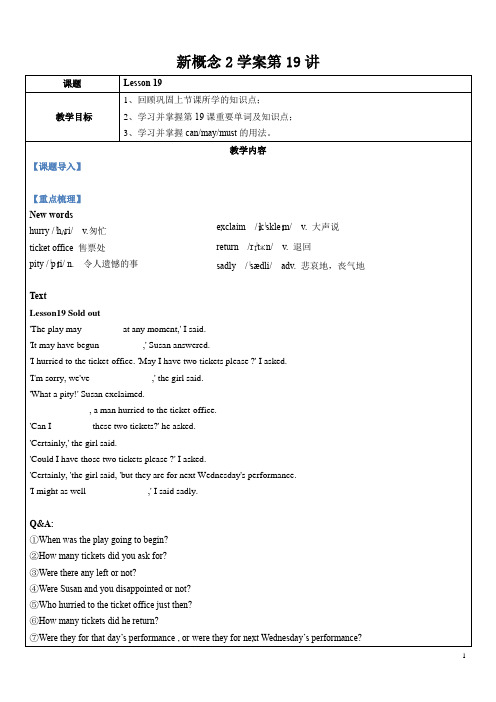
新概念2学案第19讲⑧Did you buy them or not?一、重要知识点1. Sold outsell v.v. 过去时___________过去分词________________标题中的sold out 前被省略了____________________。
例题精讲The cake ________well. Today’s cakes ______________ at 11:00 a.m.A.is sold; were sold outB.sells; were sold outC. is sold ; sold outD.sells;sold out总结:当表示“销售好、卖的好”时,表达方式为_____________________, _______(有/无) 被动语态;当表示“卖光”时,表达方式为_____________________, _______(有/无) 被动语态;助记n. _____________ 销售,销售量✧This computers are in the factory now and three days later they will be for sale.✧Almost everything is on sale on the Internet on 11th November.总结:__________________________________________________________2.'The play may begin at any moment,' I said.关于moment的短语①You can come to me ___________________________, because we are best friends.②______________________, he was listening to the radio. That was why he didn’t hear the knock on the door.【等你来挑战】一、将课文补充完整。
新概念第二册第19课课件

这是一个复合句,主句是“I now found myself wondering what I had got myself into”,其中“Although I had been looking forward to this trip for weeks”是让步 状语从句,表示尽管主人公一直期待这次旅行,但他现在却发现自己陷入了困境。
所学知识;小结部分总结本课重点难点,鼓励学生自我评价和反思。
学习方法和建议
学习方法
本课采用讲解、示范、练习和反馈相结合的教学方法,注重学生的主体性和实践 性,通过大量的口语和写作练习提高学生的语言运用能力。
学习建议
学生在学习本课时应积极参与课堂活动,认真听讲、思考和练习;同时要注重课 后的复习和巩固,通过多读、多写、多听、多说等方式提高英语水平。此外,学 生还可以借助网络资源和英语学习社群等渠道拓展学习内容和交流机会。
THANKS
感谢观看
动词不定式的用法:作为主语 、宾语、定语、状语等,表示 具体的或一次性的动作。
语法规则详解
现在完成时的构成
have/has + 过去分词,其中have用于第一人称和第三人称复数,has用于第三人称单 数。
情态动词should/ought to的用法
should表示现在或将来的责任或义务,ought to表示过去或将来的责任或义务,两者 均后接动词原形。
针对发音不准确的问题,可以通过模仿和跟读的方式提高发音准确性。
听后反思及策略调整
针对速记技巧不够熟练的问题,可以 在平时的训练中多加练习,形成自己 的速记符号和缩写方式。
针对对题目理解不够深入的问题,可 以在做题前仔细阅读题目和选项,预 测听力材料的内容,并在听后仔细核 对答案和听力原文。
新概念二册L19教案
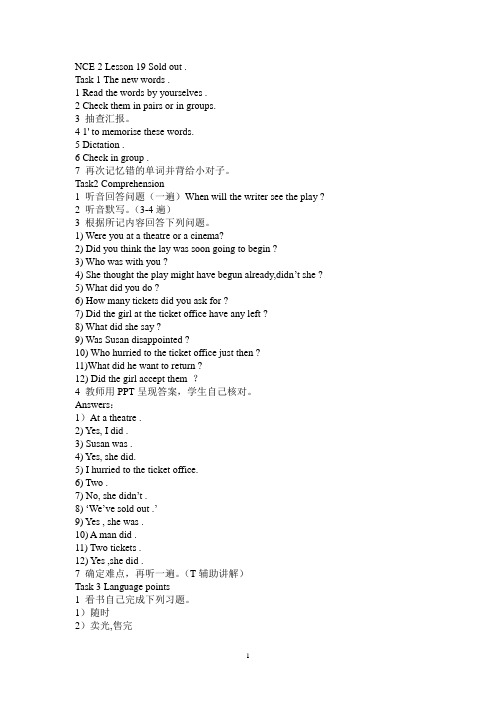
NCE 2 Lesson 19 Sold out .Task 1 The new words .1 Read the words by yourselves .2 Check them in pairs or in groups.3 抽查汇报。
4 1' to memorise these words.5 Dictation .6 Check in group .7 再次记忆错的单词并背给小对子。
Task2 Comprehension1 听音回答问题(一遍)When will the writer see the play ?2 听音默写。
(3-4遍)3 根据所记内容回答下列问题。
1) Were you at a theatre or a cinema?2) Did you think the lay was soon going to begin ?3) Who was with you ?4) She thought the play might have begun already,didn’t she ?5) What did you do ?6) How many tickets did you ask for ?7) Did the girl at the ticket office have any left ?8) What did she say ?9) Was Susan disappointed ?10) Who hurried to the ticket office just then ?11)What did he want to return ?12) Did the girl accept them ?4 教师用PPT呈现答案,学生自己核对。
Answers:1)At a theatre .2) Yes, I did .3) Susan was .4) Yes, she did.5) I hurried to the ticket office.6) Two .7) No, she didn’t .8) ‘We’ve sold out .’9) Yes , she was .10) A man did .11) Two tickets .12) Yes ,she did .7 确定难点,再听一遍。
2024版新概念第二册第19课完整ppt课件

语法练习及答案解析
01 练习一
用所给动词的正确形式填 空。
03 练习二
将下列句子改为定语从句。
02 练习三
用非谓语动词完成句子。
04 答案解析
详细解释每个练习的答案,
包括解题思路、语法点解
析等。
06
听力训练与提高
听力材料选择及技巧指导
选择与课文内容相关的听力材料,如课文背景介绍、相 关话题讨论等,帮助学生熟悉话题和语境。
模仿句型三
“They considered him a genius.”(他们认为他 是个天才。)
05
语法知识讲解与运用
时态和语态回顾
一般现在时
表示经常性或习惯性的动 作或状态,以及客观真理 或事实。
一般过去时
表示过去某个时间发生的 动作或状态。
现在进行时
表示此时此刻正在进行的 动作或状态。
时态和语态回顾
新概念第二册第19 课完整ppt课件
目录
• 课程介绍与背景 • 课文解读与赏析 • 词汇拓展与运用 • 句型结构分析与模仿 • 语法知识讲解与运用 • 听力训练与提高 • 口语表达能力提升途径探讨01Fra bibliotek课程介绍与背景
本节课程目标与内容
掌握与了解课文背景知识 训练听、说、读、写四项基本技能
学习与运用课文中的重点词汇和短语
配合多媒体资源,如音频、视 频等,提供更真实的语言环境 和模仿对象。
小组讨论和辩论活动组织
选取热门话题或学生感兴趣的主 题,组织小组讨论,鼓励学生自 由发表观点,锻炼口语表达能力。
开展辩论活动,让学生分组进行 辩论练习,提高思维敏捷性和口
语表达能力。
教师在活动中给予指导和点评, 帮助学生发现问题,改进表达技
新概念英语第二册课件Lesson19(共23页)

• ☆might(may) as well+动词原形:“还是…… 好”(无可奈何)
• had better+动词原形:“最好” (积极心态)
• eg:天看上去要下雨了:I had better take an umbrella.
• 已经下了,非带不可:I might as well take the umbrella with me.
• ☆hurry v.匆忙 • n.in a hurry • if you are not in a hurry(时间上) • if you are not busy(行为上) • in no hurry:不匆忙 • v.Hurry up.快点 • hurry可以取代go,come等 • go to:去;hurry to:匆匆忙忙地去 • come in--hurry in;go out--hurry out
• has begun 已经完成,说明已经做了;won’t begin for a long time 好久都不会开始;
• began a long time ago 过去做了
• must:一定,很可能;may:有可能;can't: 不可能
• 推测“可能”:might比may语气弱 • must>may>might>can't • 2.可以:might比may委婉 • May (Might) I...? 我可以……吗?(只
能和第一人称连用)
• Can(May) I...? • Can you...? • Could I...?(更委婉的说法)
• standing in front of shop windows exclaiming over the beautiful clothes
新概念第二册第19课课件(版)

新概念第二册第19课课件一、教学目标1.知识与技能:学生能够理解并运用本课所学的词汇和句型,描述家庭成员及其职业。
2.过程与方法:通过听、说、读、写等多种方式,提高学生的英语交际能力。
3.情感态度与价值观:培养学生热爱家庭、尊敬长辈的情感,增强对英语学习的兴趣。
二、教学内容1.词汇:father,mother,brother,sister,doctor,teacher,driver,worker2.句型:Whatdoesyourfatherdo?Heisadoctor.Whataboutyourmother?Sheisa teacher.三、教学重点与难点1.教学重点:掌握词汇和句型,能够描述家庭成员及其职业。
2.教学难点:正确使用句型进行交际,注意家庭成员称谓的用法。
四、教学过程1.热身活动(5分钟)老师与学生用英语进行自我介绍,互相询问家庭成员。
学生两人一组,用英语描述自己的家庭成员。
2.词汇学习(10分钟)老师展示图片,引导学生学习新词汇。
学生跟读并模仿发音,注意家庭成员称谓的用法。
3.句型学习(10分钟)老师示范句型的用法,引导学生进行模仿。
学生两人一组,用句型进行问答练习。
4.听力练习(10分钟)老师播放录音,学生听并回答问题。
学生两人一组,进行听力练习。
5.口语练习(10分钟)老师组织学生进行角色扮演,模拟家庭成员的交际场景。
学生两人一组,进行口语练习。
6.作业布置(5分钟)学生回家后,用英语向家人介绍家庭成员及其职业。
完成课后练习题。
五、教学评价1.课堂表现:观察学生在课堂上的参与程度、积极性和合作精神。
2.作业完成情况:检查学生作业的准确性和完整性。
3.口语表达能力:评估学生在口语练习中的表达能力和交际能力。
六、教学反思1.教师应注重培养学生的听、说、读、写综合能力,提高学生的英语交际能力。
2.教师应关注学生的学习需求,因材施教,激发学生的学习兴趣。
3.教师应加强对学生的个别辅导,帮助学生克服学习难点。
2024年度新概念英语第二册lesson19精品课件

2024/3/24
8
Analysis and Application Techniques of Synonyms
Synonym 1 vs. Synonym 2
Analyzing Content. Skills: Use synonym 1 when you want to confess this meaning, and synonym 2 when you want to express that idea
新概念英语第二册 lesson19精品课件
REPORTING
2024/3/24
1
2024/3/24
• Course Introduction and Background 目 录
• Vocabulary Expansion and Application
• Analysis and imitation of sentence
Subject+predicate+double object
This sentence structure is also common in English, where one object is an indirect object and the other is a direct object. For example, "He gave me a book."
2024/3/24
4
Textbook analysis and selection criteria
Textbook Analysis
This lesson is selected from the second volume of New Concept English, which is a classic set of English tutorials that focus on cultivating students' language proficiency and communication skills. The content of this lesson is close to daily life and can easily arouse students' interest.
新概念第二册第19课课件

8.The children ran away after they _________ the window.(break)
9.As soon as the sun ________ we returned to our hotel.(set) 10.Before he died he _________ ill.(be)
长大成人真可怕的
It must be terrible to be grown up!
演出时她必须穿一条鲜红色的裙子和黑色的 长筒袜 In the play, she must appear in a bright red dress and long black stockings.
我在一家乡村小酒店吃过午饭,就寻找我 的提包
b· May I do...? 我可以吗?(只能与第一人称相连)
· Can(May) I...? 我可以...吗? · Can you...? 你可以...吗? (第二人称不能用 “may‖ 来表示 “你可以.... 吗?‖ , 只能用 “can you....?‖ ) · Could I...? 我现在可以...吗?(在问句中更委婉的 说法, 比can I 更礼貌些)
*just then 在那时
* at once 马上
•sell-sold-sold sell out 卖完 sell well / badly 畅销/ 滞销 sell at +价格 以… 价 格出售 for sale 代售 on sale 出售 •might as well 还是… 好; 不妨 * for next Wednesday's performance 用名词所有格来取代时间 : ―...时间的” 今日报 today‘ newspaper
新概念英语2-Lesson-19教学文案
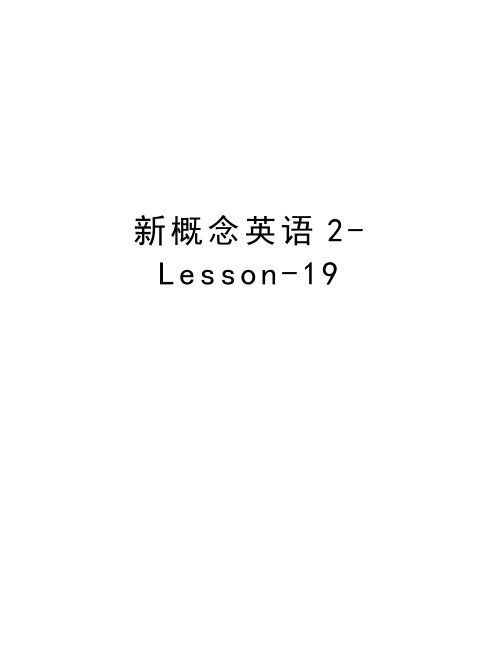
新概念英语2-L e s s o n-19Lesson 19 Sold out【New words and expressions】hurry v. 匆忙ticket office 售票处pity n. 令人遗憾的事exclaim v. 大声说return v. 退回sadly adv. 悲哀地,丧气地【Text】'The play may begin at any moment,' I said.'It may have begun already,' Susan answered.I hurried to the ticket office. 'May I have two tickets please?' I asked.'I'm sorry, we've sold out,' the girl said.'What a pity!' Susan exclaimed.Just then, a man hurried to the ticket office.'Can I return these two tickets?' he asked.'Certainly,' the girl said.I went back to the ticket office at once.'Could I have those two tickets please?' I asked.'Certainly,' the girl said, 'but they're for next Wednesday's performance. Do you still want them?' 'I might as well have them,' I said sadly.票已售完“剧马上就要开演了,”我说。
新概念二教案(L19--L24)
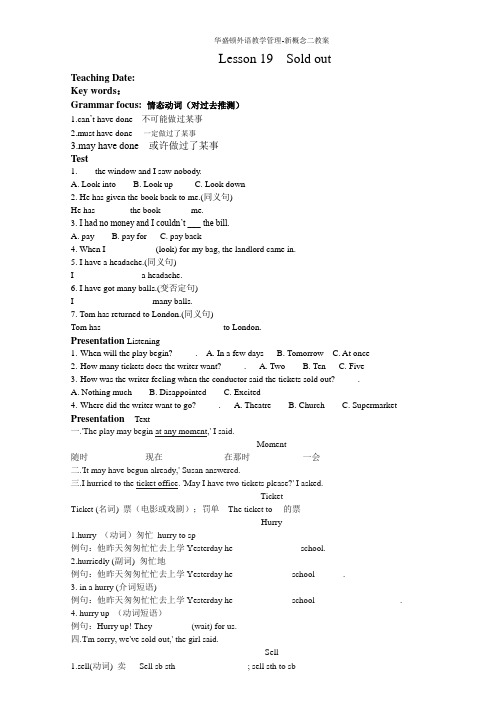
Lesson 19 Sold outTeaching Date:Key words:Grammar focus: 情态动词(对过去推测)1.can‟t have done 不可能做过某事2.must have done一定做过了某事3.may have done 或许做过了某事Test1. ___ the window and I saw nobody.A. Look intoB. Look upC. Look down2. He has given the book back to me.(同义句)He has _______ the book ______ me.3. I had no money and I couldn‟t ___ the bill.A. payB. pay forC. pay back4. When I ___________(look) for my bag, the landlord came in.5. I have a headache.(同义句)I _______ _______ a headache.6. I have got many balls.(变否定句)I ________ _________many balls.7. Tom has returned to London.(同义句)Tom has ________ _________ _________ to London.Presentation Listening1.-When will the play begin? -____. A. In a few days B. Tomorrow C. At once2.-How many tickets does the writer want? -____. A. Two B. Ten C. Five3.-How was the writer feeling when the conductor said the tickets sold out? -____.A. Nothing muchB. DisappointedC. Excited4.-Where did the writer want to go? -____. A. Theatre B. Church C. Supermarket Presentation Text一.'The play may begin at any moment,' I said.Moment随时___________ 现在____________ 在那时____________一会____________二.'It may have begun already,' Susan answered.三.I hurried to the ticket office. 'May I have two tickets please?' I asked.TicketTicket (名词) 票(电影或戏剧);罚单The ticket to ---的票Hurry1.hurry (动词)匆忙hurry to sp__________________例句:他昨天匆匆忙忙去上学Yesterday he _______ _______ school.2.hurriedly (副词) 匆忙地例句:他昨天匆匆忙忙去上学Yesterday he ______ ______ school ______.3. in a hurry (介词短语) ____________________例句:他昨天匆匆忙忙去上学Yesterday he ______ ______ school ______ ______ ______.4. hurry up (动词短语)_______________例句:Hurry up! They ________ (wait) for us.四.'I'm sorry, we've sold out,' the girl said.Sell1.sell(动词) 卖Sell sb sth ________________; sell sth to sb__________________2.sale(名词)出售on sale (大甩卖)出售3.sell out 卖完;脱销sell well 易于销售例句:Those books sell well.五.'What a pity!' Susan exclaimed.六.Just then, a man hurried to the ticket office.七.'Can I return these two tickets?' he asked.八.'Certainly,' the girl said.九.I went back to the ticket office at once.十.'Could I have those two tickets please?' I asked.十一.'Certainly,' the girl said, 'but they're for next Wednesday's performance. Do you still want them?'十二.'I might as well have them,' I said sadly.情态动词…最好‟Might as well 情态动词后接动词原形“还是--- 好” 含有消极心态Had better情态动词后接动词原形“最好”含有积极心态Exercise:1.These shirts sell ______(good).2.____the garden is! A. What a beautiful B. How beautiful C. What beautiful3.He had better ________(not study) at night.4.-Could you stay here for a minute?(做肯定回答) ______ ,______ ______.5.I went back to the hotel at once.(变同义句)I ______ _______ the hotel ______ ______.Abstract________________________________________________________________________ ________________________________________________________________________ ________________________________________________________________________Lesson 20 One man in a boat.Teaching Date:Key words:Grammar focus: 动名词作主语:Swimming is my hobby. Teaching is my job.做定语:This a swimming pool. I like to see the passing planes.做宾语:I enjoy eating fruit. I can finish doing my homework.Testa. The play may begin ___.A. at that momentB. at the momentC. at any momentb. The movie may ___ already.A. beginB. have begunC. beganc. Tom hurried to school this morning.(同义句)Tom went to school _____ _____ ______ this morning.d. I‟m sorry, we ____ all the food.A. sell outB. sold outC. have sold oute. ___ a good boy he is!A. HowB. WhatC. Suchf. …___ I buy those two tickets ?‟ I asked.A. MayB. WillC. ShallD. Couldg. I might as well ________(fish) my homework now.Presentation Listening1.-Does the writer like fishing? -______ ,______ ______.2.-Is he really interested in fishing? -_______ ,______ ______.3.-What does the writer really like doing? -____.A. FishingB. Sitting in a boat and doing nothingC. Catching nothing4.-What do his friends tell him to do? -____. A. Keep fishing B. Stop fishing C. Do nothing Presentation Text一.Fishing is my favorite sport.Fish1.fish 鱼肉(u)2.fish(动词) 钓鱼go fishing3. fish 鱼(当不强调种类只说条数时候单复数是fish;当强调种类时候复数是fishes)4.哲理Never teach fish to swim.不要班门弄斧。
- 1、下载文档前请自行甄别文档内容的完整性,平台不提供额外的编辑、内容补充、找答案等附加服务。
- 2、"仅部分预览"的文档,不可在线预览部分如存在完整性等问题,可反馈申请退款(可完整预览的文档不适用该条件!)。
- 3、如文档侵犯您的权益,请联系客服反馈,我们会尽快为您处理(人工客服工作时间:9:00-18:30)。
LESSON 19Words1.hurry [ˈhʌri] n.&v.n. 匆忙;急忙:e.g. 悠着点—不用急。
Take your time—there’s no hurry.in a hurry (=hurriedly adv.匆忙地,仓促地, 匆忙地,迅速地)1) 迅速;赶快;仓促;匆忙:(in a hurry to do sth.急于做某事)e.g. 他不得不赶快离开了。
He had to leave in a hurry.2) in no hurry (to do sth.) / not in a/any hurry (to do sth.)有足够的时间,不着急(做某事):我不急。
---I’m in no hurry.v. (hurries, hurrying, hurried, hurried)1)赶快,匆忙,急忙(做某事)e.g. [v] 不要着急,(我们)有大量的时间。
(hurry to do sth./some place)Don’t hurry, there is plenty of time.我匆忙地赶到学校。
I hurried to school.2)[vn] ~sb. (into doing sth.) 催促(某人) synonym: rushe.g. 我们已经迟到了,我必须催促你了。
We are late, I must hurry you.hurry up (with sth.)赶快,急忙(做某事):e.g. 快点!我们要迟到了。
Hurry up! We’re going to be late.2.exclaim [ikˈskleim] v. (由于强烈的情感或痛苦而)惊叫,呼喊:e.g. 她大声地说:“多遗憾啊!”“What a pity!” She exclaimed.[拓展]1)shout v.呼喊,大声说话,吼叫,叫,嚷shout out 吼出声来/喊出声来shout out at sb. 对……大喊大叫2)scream v. (因伤痛、害怕、激动等)尖叫、惨叫、惊叫exclamation[ˌekskləˈmeɪʃn] n. 感叹;感叹语;感叹词exclamation mark 感叹号3.return v. 1) 回来;回去;返回e.g. 你什么时候回到伦敦?When are you returning to London?2) 带回;送回;放回;归还,退还~sb./sth.(to sb./sth.)e.g.我准备去图书馆还书。
I’m going to the library to return my books.n. 1) [c;u (from, to)] 返回,回来;往返e.g. return ticket 往返票我们盼望你从美国回来。
We look forward to your return from America.2. [u] 归还;回报4.pity [ˈpiti] n.&v.n.1) 同情;怜悯;遗憾(what a pity),可惜be full of pity for sb./be filled with pity for sb. 十分同情某人feel pity for sb. 对…表示同情have/take pity on sb. 同情怜悯某人e.g. 我同情她,就把钱借给了她。
I took pity on her and lent her the money.真遗憾,她没有早点告诉我。
What a pity that she didn’t tell me earlier.v.同情;怜悯;可怜e.g. 他同情那些没有工作的人。
He pitied people who were out of work.pitiful[ˈpɪtɪfl] adj. 令人同情的;可怜的pitiable [ˈpɪtiəbl] adj. 值得同情的;可怜的5.sadly[ˈsædlɪ]adv.1)令人遗憾;不幸地e.g. 可惜的是,我的时间有限。
Sadly, my time is limited.2.)in a sad way悲伤地;伤心地:e.g. 她难过地摇摇头。
She shook her head sadly.[复习]sad adj. (sadder, saddest)1) 悲哀的;难过的;显得悲哀的;令人悲哀的;让人难过的;e.g. 听说你要走了,我们十分难过。
We are very sad to hear that you are leaving.悲惨的故事;忧伤的诗;悲凉的歌a sad story/poem/songsadness n.Text1.sell [sel]v.&n.v. (sold, sold[səʊld])1)出售;售卖;出让;转让:~sth. (to sb.) (at/for sth.) / ~sb. sth. (at/for sth.)e.g. 我把我的汽车转让给了詹姆斯,获得800英镑。
I sold my car to James for /at 800 pounds.I sold James my car for/at 800 pounds.你这儿卖邮票吗?Do you sell stamps?2) 销售得…;卖出…;售价是… sell for /at 价格以…价格出售sell well畅销sell badly 滞销e.g. 这种杂志一周售出30万册。
The magazine sells 300,000 copies a week.sell oneself 自荐;自我推销:[拓展]1.Phr.v.1) sell out / be sold out (音乐会、足球赛等的门票) 售完:e.g.几小时内票就卖光了。
The tickets sold out within hours.sell out of sth. 脱销:e.g. 抱歉,我们的面包卖完了。
I’m sorry, we’ve sold out of bread.2)seller[ˈselə]n. 销售者;卖方(反义:buyer);(畅销、滞销等的)商品:e.g. a good/bad/poor seller 畅销/滞销的商品3)sale[seil]n. 出售;销售;销售量for sale 待售;供出售(尤指从主人手里)on sale 出售,上市;折价销售;减价出售:salesman n. 男售货员;男推销员saleswoman n. 女售货员;女推销员2.at this moment =now ;at that moment = then3.may/might as well do “还是…好,不妨”。
较勉强,不是非常乐意,不得不选一个。
两者一般可以互换。
e.g. –Do you think you’ll pass the exam? 你认为你会通过考试吗?--I’ll never pass. I might as well give up.我决不会通过考试的,我还是放弃的好。
Key structurecan/could/may/might1.can/ could1) can(过去式为could)意为“有能力”、“能够”:2)can (could)用于否定或疑问句中后面跟动词原形的完成式时,表示对过去发生事件的“可能性”。
而could较can更加表示说话人的“不肯定的”语气。
如:e.g. 他会是走了吗?Can he have left already?她会把我的地址忘记了吗?Could she have forgotten my address?3)can+not+动词原形表示否定推测意为“不可能”。
2.may/might1)表示“允许”或“请求”,询问或说明一件事可不可做e.g. 我能打扰一下问你一个问题吗?May I trouble you with a question?2) 表推测(或是某种情况可能会存在);may (might) +have done表示对过去发生的事情进行推测她今天可能不在那儿。
She may not be there today.注:在否定句中一般不用may not ,常用can’t 表示“不可能”。
例如:He can’t be at home tonight. 今晚他不可能在家。
3)may还可用在感叹句中来表示希望、祈求、祝愿,常可译为“祝愿”。
如:e.g. 希望那天快点到来。
May that day come soon.Special difficulties缩写。
Multiple choice questionKEY:1. a2. d3. c4. c5. d6. b7. c前一句子I might as well have them(我还是把他们买下来吧),表示说话人不情愿或勉强这样做。
a. verypleased(非常高兴),b. very glad(很高兴) 与d.delighted(极为高兴)都与这个句子的含义相反,只有c. not very glad 符合题目意思,因此选c.8. b 9. c 10. a只有a. give them back 与前面的returned(还给) 的意思相同,而其他3个选择b. give them in(交上它们), c. give them up (放弃它们) , d. give them off(发放它们) 都没有“归还”的意思。
11. c 12. c只有c. now 才能使句子同前面的句子Do you still want them? (你还想要它吗?)的意思吻合.而a. yet,b. even, d. more 都不符合语法和题目意思.。
